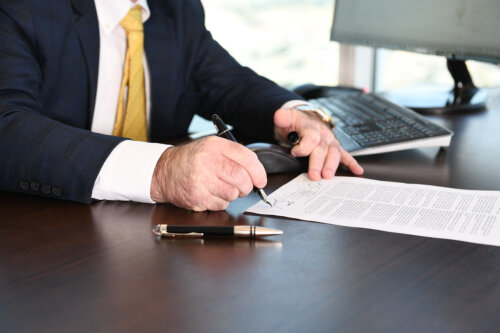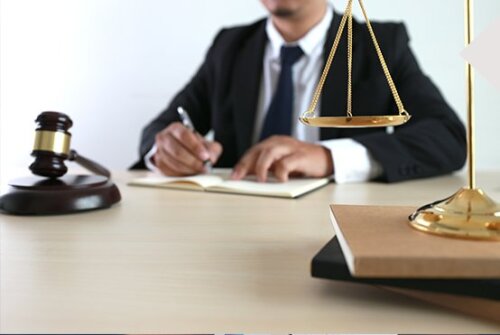Best Ethics and Professional Responsibility Lawyers in Bnei Brak
Share your needs with us, get contacted by law firms.
Free. Takes 2 min.
List of the best lawyers in Bnei Brak, Israel
About Ethics and Professional Responsibility Law in Bnei Brak, Israel
Ethics and Professional Responsibility covers rules, standards and enforcement mechanisms that govern how professionals should act toward clients, employers, colleagues and the public. In Bnei Brak, as elsewhere in Israel, these rules draw on national statutes, professional codes adopted by licensing bodies, court decisions and local institutional norms. Because Bnei Brak is a predominantly Haredi city with strong religious institutions and communal frameworks, some ethical disputes may also involve religious courts or community rabbinic authorities. However, statutory and regulatory frameworks set by Israeli state institutions remain decisive for licensing, criminal liability, and statutory disciplinary procedures.
Commonly regulated fields include the legal profession, medicine, dentistry, nursing, teaching, public service, social work and regulated trades. Professional responsibility issues range from conflicts of interest, confidentiality breaches and negligence to fraud, improper billing and conduct that brings a profession into disrepute. Enforcement can take the form of internal employer discipline, administrative sanctions by licensing authorities, professional disciplinary hearings, civil lawsuits and, when relevant, criminal prosecution.
Why You May Need a Lawyer
There are many situations where a lawyer with experience in ethics and professional responsibility is helpful or essential. A lawyer can clarify rights, represent you before disciplinary organs, negotiate settlements, manage investigations and, if needed, advance civil or criminal litigation. Typical situations include:
- Facing a professional disciplinary complaint filed with a licensing authority or professional court.
- Being investigated for alleged misconduct by an employer, public body or regulator.
- Accusations of breach of confidentiality or improper disclosure of client or patient information.
- Allegations of conflicts of interest, improper referral payments or prohibited financial relationships.
- Disputes over billing practices, false claims or fraud allegations.
- Seeking to file a complaint against a professional whose conduct harmed you.
- Needing guidance when a matter overlaps between civil liability and professional discipline, for example when professional negligence may also support a malpractice suit.
- Navigating cases that may involve both state courts and religious courts, where coordination and strategic decisions are required.
Local Laws Overview
While professional ethics in Bnei Brak are informed by local communal norms, the legal framework is national. The key components you should know are:
- National statutes and regulations: Many professions are governed by Israeli statutes and ministerial regulations that set licensing criteria, grounds for disciplinary action and the powers of supervising ministries. Examples include health laws for medical and nursing professions and specific acts that regulate legal practice.
- Professional codes of conduct: Professional associations such as the Israel Bar Association and Israel Medical Association adopt codes of ethics and disciplinary procedures that members must follow. These codes often define misconduct, outline complaint procedures and set potential sanctions.
- Disciplinary courts and committees: Most regulated professions use dedicated disciplinary committees or courts to hear complaints. For lawyers, the Israel Bar Association operates disciplinary tribunals. Health professionals can face disciplinary proceedings under the Ministry of Health or their professional body. Decisions may include reprimands, fines, suspension or revocation of a license.
- Civil and criminal law overlay: Professional misconduct can lead to civil claims for damages, contract remedies or injunctions. In serious cases, criminal prosecution for fraud, breach of trust or negligent homicide may apply under Israeli criminal law.
- Employment law and contracts: Many disputes begin as employer investigations or contractual disputes. Employment law governs internal disciplinary steps, appeal rights and termination procedures.
- Religious and communal frameworks: In Bnei Brak, many residents consult beit din or rabbinic authorities for dispute resolution in personal or communal matters. Religious courts can issue binding decisions on matters within their jurisdiction, but their powers do not replace statutory criminal or administrative enforcement.
- Language and procedural considerations: Proceedings before state bodies, courts and regulators are typically in Hebrew. In Bnei Brak, Yiddish and religious sensitivities may be important when selecting counsel and presenting evidence.
Frequently Asked Questions
What should I do first if a complaint is filed against me with a professional regulator?
Remain calm and seek legal advice promptly. Preserve relevant records and communications, avoid making admissions, and follow any immediate procedural requirements in the notice. Contact a lawyer experienced in disciplinary defense who can assess the complaint, advise on responses, request extensions if needed and prepare your defense or settlement options.
Can a beit din decide professional licensing or discipline matters instead of state bodies?
No. Religious courts may resolve certain contractual or personal disputes by agreement of the parties, and their decisions carry moral and communal weight. However, statutory licensing and disciplinary powers for regulated professions are exercised by state authorities and professional regulators under Israeli law. A beit din cannot revoke a professional license issued by the state.
Will a professional disciplinary record affect my ability to work in other cities or countries?
Yes. Many licensing bodies and employers ask about disciplinary history. A serious sanction can affect future licensure applications, cross-border recognition and employment opportunities. Some foreign regulators also request disclosure of prior disciplinary actions when assessing credentials.
What are common sanctions in professional disciplinary cases?
Sanctions vary by profession and severity. They commonly include warnings, reprimands, fines, mandatory corrective orders, suspension of practice for a period, conditions on continued practice, and in severe cases, revocation of license. Public publication of the sanction may also occur.
Can I represent myself in a disciplinary hearing?
You can represent yourself in many disciplinary proceedings, but it is usually unwise. Professional regulators and disciplinary tribunals follow complex procedures and evidentiary rules. An experienced lawyer can preserve legal rights, challenge procedural errors, advise on plea or settlement offers and improve outcomes.
How long do disciplinary investigations and hearings typically take?
Timing varies widely. Preliminary investigations can take weeks to months. Formal hearings may be scheduled months after charges are filed, and appeals can extend the process further. Serious cases involving parallel criminal investigations often take longer. Your lawyer can give a realistic timeline based on the facts and the specific regulator.
What rights does a complainant have when filing a complaint against a professional?
A complainant generally has the right to submit evidence, receive a written acknowledgement, be informed of outcomes in accordance with the regulator's rules and, in some cases, seek civil remedies for harm. Confidentiality protections apply to different degrees depending on the proceeding. A legal advisor can help frame the complaint and explain what relief is reasonable to expect.
When should I consider engaging mediation or arbitration instead of a disciplinary process?
Mediation or arbitration can be useful when the core issue is a contractual dispute, interpersonal conflict or damages that both sides prefer to resolve privately and quickly. These approaches often preserve relationships and can avoid public disciplinary records. They are less suitable where public protection, criminal wrongdoing or license revocation is at stake.
How does confidentiality work in ethics complaints - will my case become public?
Confidentiality depends on the rules of the regulatory body and the stage of proceedings. Initial complaints and investigations are often treated confidentially, but formal hearings and sanctions may become public records. Some professions publish disciplinary decisions to protect the public. Your lawyer can advise on confidentiality protections and potential public exposure.
How do I choose the right lawyer in Bnei Brak for an ethics or professional responsibility matter?
Look for a lawyer with specific experience in professional disciplinary law and knowledge of the relevant profession's regulatory framework. Experience with local practice in Bnei Brak and familiarity with religious and communal sensitivities can be helpful. Ask about prior disciplinary defense results, languages spoken, fee structure and whether the lawyer handles both administrative and civil litigation if necessary.
Additional Resources
If you need more information or want to file a complaint, the following types of institutions and organizations can be helpful. They provide guidance, receive complaints or oversee professional conduct:
- National regulatory bodies and supervising ministries that oversee licensing and discipline for specific professions.
- Professional associations and disciplinary tribunals for lawyers, doctors, nurses, dentists and other regulated professions.
- Bnei Brak municipal offices and local public service units for matters that touch on municipal employees or local public integrity issues.
- Ministry of Health for complaints about medical professionals and facilities, including inquiries into clinical standards.
- Israel Bar Association for complaints or inquiries about attorney conduct and access to disciplinary processes.
- Professional councils or unions for teachers, social workers and other licensed occupations.
- Beit din and recognized rabbinic authorities for religious-communal dispute resolution, where parties agree to their jurisdiction.
- Legal aid clinics and nonprofit organizations that provide advice or representation in certain cases, especially for vulnerable populations.
Next Steps
If you believe you need legal assistance in an ethics or professional responsibility matter in Bnei Brak, consider this practical roadmap:
- Preserve evidence: Secure documents, emails, contracts, invoices and any communications relevant to the issue. Make copies and keep originals safe.
- Get initial advice: Arrange a consultation with a lawyer experienced in professional disciplinary law. Ask about confidentiality of the consultation and what information they need to assess your case.
- Understand costs: Ask about fees, retainer requirements, billing practices and whether the lawyer offers limited-scope services or payment plans.
- Check language and cultural fit: Ensure the lawyer can communicate in your preferred language and understands any religious or communal considerations relevant to your case.
- Develop a strategy: Work with your lawyer to decide whether to seek negotiation, mediation, a formal complaint, defense in a disciplinary hearing or civil litigation. Consider timing, risks and desired outcomes.
- Follow procedural steps: Meet filing deadlines, comply with requests from regulators and attend hearings as advised. Keep your lawyer informed of any new developments.
- Consider appeal and settlement options: If a decision is adverse, discuss appeals or settlement possibilities. If you are a complainant, consider whether civil remedies or mediation might achieve your goals.
Facing an ethics or professional responsibility matter can be stressful. Acting promptly, documenting thoroughly and consulting an experienced lawyer will give you the best chance of protecting your rights and achieving a fair outcome.
Lawzana helps you find the best lawyers and law firms in Bnei Brak through a curated and pre-screened list of qualified legal professionals. Our platform offers rankings and detailed profiles of attorneys and law firms, allowing you to compare based on practice areas, including Ethics and Professional Responsibility, experience, and client feedback.
Each profile includes a description of the firm's areas of practice, client reviews, team members and partners, year of establishment, spoken languages, office locations, contact information, social media presence, and any published articles or resources. Most firms on our platform speak English and are experienced in both local and international legal matters.
Get a quote from top-rated law firms in Bnei Brak, Israel — quickly, securely, and without unnecessary hassle.
Disclaimer:
The information provided on this page is for general informational purposes only and does not constitute legal advice. While we strive to ensure the accuracy and relevance of the content, legal information may change over time, and interpretations of the law can vary. You should always consult with a qualified legal professional for advice specific to your situation.
We disclaim all liability for actions taken or not taken based on the content of this page. If you believe any information is incorrect or outdated, please contact us, and we will review and update it where appropriate.












